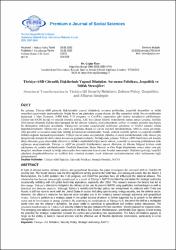| dc.contributor.author | Özer, Çağlar | |
| dc.date.accessioned | 2025-11-13T13:58:42Z | |
| dc.date.available | 2025-11-13T13:58:42Z | |
| dc.date.issued | 2025 | en_US |
| dc.identifier.citation | Özer, Çağlar. (2025). Türkiye-ABD Güvenlik İlişkilerinde Yapısal Dönüşüm: Savunma Politikası, Jeopolitik ve İttifak Stratejileri. Premium E-Journal of Social Sciences (PEJOSS), 9(57), 814–826. | en_US |
| dc.identifier.issn | 2687-5640 | |
| dc.identifier.uri | https://pejoss.com/index.php/pub/article/view/754 | |
| dc.identifier.uri | https://doi.org/10.5281/zenodo.17014149 | |
| dc.identifier.uri | https://hdl.handle.net/20.500.12780/1263 | |
| dc.description.abstract | Bu çalışma, Türkiye-ABD güvenlik ilişkilerindeki yapısal dönüşümü, savunma politikaları, jeopolitik dinamikler ve ittifak
stratejileri çerçevesinde incelemektedir. Soğuk Savaş’tan günümüze uzanan süreçte, iki ülke arasındaki ittifak, Sovyet tehdidinden
başlayarak 1 Mart Tezkeresi, S-400 krizi, F-35 programı ve CAATSA yaptırımları gibi kırılma noktalarıyla şekillenmiştir.
Türkiye’nin NATO üyeliği ve stratejik özerklik arayışı, ABD’nin küresel liderlik stratejileriyle zaman zaman çatışmış, özellikle
2010 sonrası dönemde ilişkiler daha karmaşık bir hal almıştır. Çalışma, nitel yöntemlerle, tarihsel ve tematik analizler aracılığıyla
bu dönüşümün tetikleyici unsurlarını, Türkiye’nin savunma sanayisindeki millileşme çabalarını ve NATO içindeki rolünü
değerlendirmektedir. Türkiye’nin çok yönlü dış politikası, Rusya ve Çin ile ilişkileri derinleştirirken, ABD ile enerji güvenliği,
siber güvenlik ve savunma sanayiinde işbirliği potansiyelini korumaktadır. Ancak, stratejik özerklik eğilimi ve jeopolitik rekabet,
ittifakın doğasını karmaşıklaştırmaktadır. Türkiye’nin savunma sanayisindeki yükselişi ve enerji koridorlarındaki rolü, küresel güç
dengelerinde stratejik bir aktör olarak konumunu güçlendirmektedir. Bu bağlamda, çalışma, Türkiye-ABD ilişkilerinin çok kutuplu
dünya düzenine geçiş sürecindeki etkilerini ve ittifakın sürdürülebilirliğini analiz ederek, jeopolitik ve savunma politikalarına katkı
sağlamayı amaçlamaktadır. Türkiye ve ABD’nin güvenlik ilişkilerindeki yapısal dönüşüm, iki ülkenin bölgesel krizlere ortak
yaklaşımını da yeniden şekillendirmiştir. Özellikle Karadeniz, Doğu Akdeniz ve Orta Doğu bölgelerinde ortaya çıkan yeni güç
dengeleri, tarafların stratejik iş birliği potansiyelini hem sınamakta hem de yeni fırsatlar sunmaktadır. İlişkilerin geleceği, karşılıklı
çıkarların dengelenebilmesine ve özellikle kriz yönetimi alanında esnek diplomasi mekanizmalarının etkin kullanımına bağlı
görünmektedir. | en_US |
| dc.description.abstract | In light of alliance tactics, military policies, and geopolitical dynamics, this paper investigates the structural shift in Türkiye-US
security ties. The Soviet menace was the first significant turning point in the Cold War, and subsequent events like the March 1
Memorandum, the S-400 problem, the F-35 program, and CAATSA penalties have all influenced the bilateral alliance. The
relationship has become increasingly complicated as a result of Türkiye’s NATO membership and desire for strategic autonomy
occasionally colliding with US global leadership aspirations, especially after 2010. This research assesses the factors that led to
this change, Türkiye’s attempts to indigenize its military sector, and its place in NATO using qualitative methodologies as well as
historical and thematic analysis. Although Türkiye’s multifaceted foreign policy has strengthened its relations with China and
Russia, it still has room to work with the United States in sectors including cybersecurity, energy security, and the defense sector.
However, the alliance’s character has become more complex due to the tendency toward strategic autonomy and geopolitical
rivalry. Türkiye’s position as a strategic player in the global balance of power is further supported by its growth in the defense
sector and its involvement in energy corridors. By examining the ramifications of Türkiye-U.S. ties amid the shift to a multipolar
world order and the alliance’s durability, the paper seeks to contribute to geopolitical and military policy discussions. The
structural transformation in Türkiye-US security relations has also reshaped the two countries’ shared approach to regional crises.
The emerging new balance of power, particularly in the Black Sea, Eastern Mediterranean, and Middle East regions, is both testing
the potential for strategic cooperation between the parties and presenting new opportunities. The future of relations appears to
hinge on the ability to balance mutual interests and the effective use of flexible diplomatic mechanisms, particularly in crisis
management. | en_US |
| dc.language.iso | tur | en_US |
| dc.publisher | Nur Banu Ateş | en_US |
| dc.relation.isversionof | 10.5281/zenodo.17014149 | en_US |
| dc.rights | info:eu-repo/semantics/openAccess | en_US |
| dc.subject | Türkiye-ABD İlişkileri | en_US |
| dc.subject | Güvenlik Politikası | en_US |
| dc.subject | Stratejik Özerklik | en_US |
| dc.subject | NATO | en_US |
| dc.subject | Türkiye–U.S. Relations | en_US |
| dc.subject | Security Policy | en_US |
| dc.subject | Strategic Autonomy | en_US |
| dc.title | Türkiye-ABD güvenlik ilişkilerinde yapısal dönüşüm: Savunma politikası, jeopolitik ve ittifak stratejileri | en_US |
| dc.title.alternative | Structural transformation in Türkiye-US security relations: Defense policy, geopolitics and alliance strategies | en_US |
| dc.type | article | en_US |
| dc.contributor.department | İstanbul Kent Üniversitesi, Fakülteler, İktisadi, İdari ve Sosyal Bilimler Fakültesi, Siyaset Bilimi ve Kamu Yönetimi Bölümü | en_US |
| dc.contributor.authorID | 0000-0003-3090-4740 | en_US |
| dc.contributor.institutionauthor | Özer, Çağlar | |
| dc.identifier.volume | 9 | en_US |
| dc.identifier.issue | 57 | en_US |
| dc.identifier.startpage | 814 | en_US |
| dc.identifier.endpage | 826 | en_US |
| dc.relation.journal | Premium e-Journal of Social Sciences | en_US |
| dc.relation.publicationcategory | Makale - Uluslararası Hakemli Dergi - Kurum Öğretim Elemanı | en_US |


















